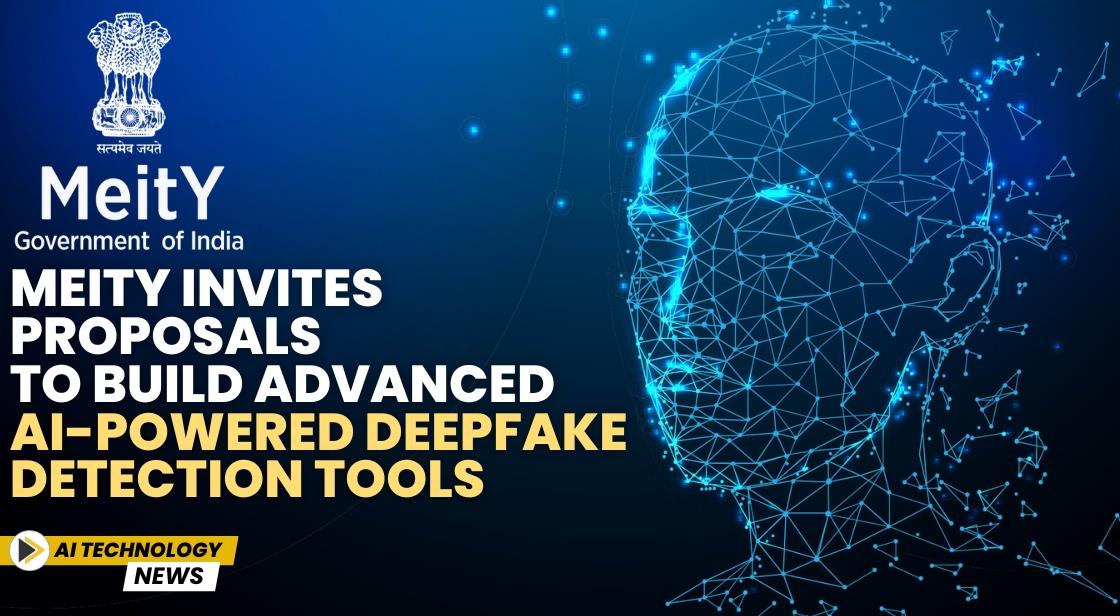MeitY Invites Proposals to Build Advanced AI-Powered Deepfake Detection Tools

News Synopsis
The Ministry of Electronics and Information Technology (MeitY) has taken a proactive step in strengthening India’s digital security framework by seeking proposals for the development of AI-powered tools to detect deepfakes. This initiative aims to address the growing menace of misinformation and media manipulation caused by advancements in AI-generated content.
Deepfake Detection: A Priority for MeitY
In an expression of interest (EoI) floated by the Ministry, MeitY has invited five proposals from startups, academic institutions, private enterprises, and R&D organisations for the development of indigenous technical tools and frameworks to combat the threats posed by deepfakes.
“With the increase in realism of deepfakes due to advancements in AI, it is imperative to develop deepfake detection methods that safeguard against potential misinformation and manipulation in society,” read the document.
The proposed deepfake detection tools are expected to leverage:
-
Sophisticated deep learning algorithms to identify altered content.
-
Provenance-based techniques to trace the origin and authenticity of media files.
-
Other advanced detection methods to analyse and flag manipulated content effectively.
Ministry of Electronics and Information Technology (MeitY) envisions these tools being seamlessly integrated into web browsers and social media platforms, enabling real-time detection, automated cross-modal content verification, and enhanced digital ecosystem security.
Focus Areas of AI Tool Development
1. Detecting AI-Generated Content
MeitY is also prioritising the development of tools to differentiate between AI-generated content and non-AI-generated content. These tools will embed unique, imperceptible markers in AI-generated outputs to ensure traceability, enhance security, and prevent the misuse of AI in generating harmful or illegal content.
2. Stress Testing AI Systems
Another critical project involves creating a stress-testing platform to evaluate how AI systems perform under high-pressure scenarios such as natural disasters, cyberattacks, or data failures. The platform will employ simulation-based testing or stress evaluation metrics to identify system weaknesses and fortify resilience under extreme conditions.
“Stress testing can provide actionable insights into system weaknesses and ensure preparedness for high-stakes situations. This theme focuses on the development of tools and methodologies such as simulation-based testing or stress evaluation metrics specifically designed to fortify the resilience of AI systems under stress,” the EoI stated.
3. Ethical AI Frameworks
In addition to technical tools, MeitY has also emphasised the importance of ethical AI by calling for proposals to develop ethical AI frameworks. These frameworks aim to ensure that AI systems adhere to fundamental human values, fairness, transparency, accountability, and do not perpetuate biases or discrimination.
“To enable largescale adoption of AI, there is a need to develop comprehensive AI Risk Assessment and Management tools and frameworks designed to identify, assess, and mitigate cross-sectoral safety risks, ensuring failures in one area are contained and managed without affecting interconnected sectors,” the document added.
Strengthening the AI Ecosystem
The projects are part of the larger IndiaAI Mission, which focuses on fostering innovation and building a trusted AI ecosystem in the country. The Ministry has underscored its commitment to balancing innovation with safety, as highlighted by IT Secretary S Krishnan, who recently stated that the government is building a mechanism to evaluate the safety and trustworthiness of AI solutions.
Union IT Minister Jyotiraditya Scindia echoed a similar sentiment earlier this year, stressing the importance of ethical considerations and robust regulatory frameworks for AI deployment.
India’s Growing Generative AI Ecosystem
The initiative is timely, as India’s generative AI ecosystem is rapidly expanding. With over 200 AI startups, the sector has attracted more than $1.2 billion in funding between 2020 and Q3 2024. The ecosystem is becoming a global hub for innovation in AI technologies, including generative AI and deepfake detection.
Conclusion
The Ministry of Electronics and Information Technology (MeitY) is spearheading India's efforts to harness AI responsibly and effectively, focusing on combating emerging threats like deepfakes and enhancing the resilience of AI systems. By inviting proposals for cutting-edge tools and ethical frameworks, MeitY aims to create a secure and transparent digital ecosystem while fostering innovation in the country’s growing AI sector.
This initiative aligns with the broader IndiaAI Mission, which seeks to establish India as a global leader in AI development and adoption. With a thriving generative AI ecosystem and a balanced approach to regulation, India is poised to leverage the transformative potential of AI while ensuring the safety and trustworthiness of its applications.
By addressing ethical concerns, promoting cross-sectoral risk assessment, and emphasizing collaboration among startups, academia, and private enterprises, MeitY’s vision underscores a commitment to innovation without compromising on accountability. This comprehensive strategy will not only bolster India’s digital security framework but also position the country as a model for AI governance and implementation on a global scale.
You May Like









